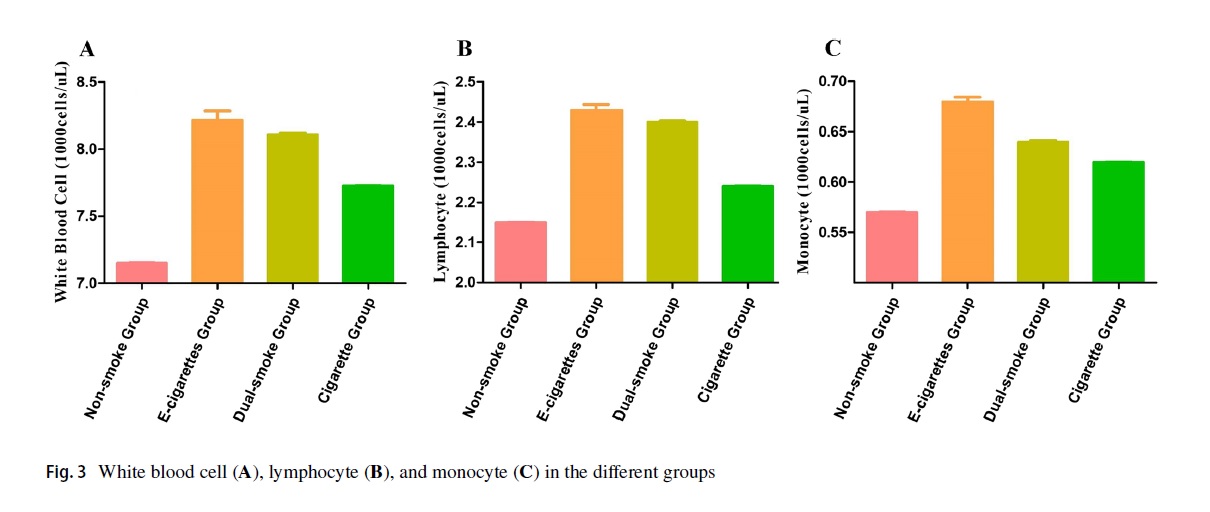Yao Wang and colleagues compared the results of the Complete Blood Count (CBC), a routine blood tests used in clinical practice to diagnose a range of conditions, among participants in the US National Health and Nutrition Examination Survey (NHANES). In contrast to most national health survey, NHANES includes in person clinical tests on participants. Their paper “Association between electronic cigarettes use and whole blood cell among adults in the USA-a cross-sectional study of National Health and Nutrition Examination Survey analysis” found a range of differences between never smokers and e-cigarette users.
For example, they found increases in white blood cells and different subtypes of white blood cells (graph above, from their paper) among e-cigarette users compared to smokers. The increase in mean white blood cell count from 7.15 to 8.22 (1000 cells/ul) is within the range of normal WBC counts, but is statistically significant. It could reflect more infections, higher baseline inflammatory state or other changes. (Lymhocytes and monocytes are types of white blood cells.)
The associations with cigarette smoking and dual use are harder to interpret because Wang and colleagues assessed ever smokers rather than current smokers, so the group includes former smokers. That may indicate why the cigarette smoking and dual use (defined as current e-cigarette users who are ever smokers) categories, while elevated above never smokers, as below current e-cigarette users.
Wang and colleagues also conclude that the changes in blood measures among e-cigarette users are similar to those observed in smokers and dual users. These conclusions need to be interpreted cautiously because smokers are ever smokers not current smokers.
This paper suggests that further study of the effects of e-cigarettes and dual use on blood would be a productive line of investigation
There were also changes in red blood cells.
Here is the abstract:
Electronic cigarettes (E-cigarettes) use is an emerging public health problem. Trying to assess the independent associations between E-cigarettes use and whole blood cell in a nationally representative sample of the US adults is very important for the smoking population. Using E-cigarettes data from NHANES (National Health and Nutrition Examination Survey) 2013-2018, 17,180 adults were included in this cross-sectional analysis. All participants were stratified into four different groups (non-smoke group N=10087, E-cigarettes group N=52, dual-smoke group N=249, cigarettes group N=6792) based on questions SMQ020 (smoked at least 100 cigarettes in life) and SMQ690H (used last 5 days E-cigarettes). Whole blood cell tests included white blood cell (WBC) with differentials, red blood cell (RBC) with characteristics, and platelet variables. With adjusted by age, gender, and race ethnicity, multivariate logistic regression analyses were used to assess independent associations between E-cigarettes group and other groups for different whole blood cell variables. A total of 17,180 participants were included in the study; 47.9% were males, with a mean age of 46.99 (±0.29). In WBC-related variables, non-smoke group had the lowest value in WBC counts (7.15±0.05), lymphocyte (2.15±0.02), and monocyte (0.57±0.01), among the four different groups. In RBC-related variables, non-smoke group had the lowest value in mean cell volume (MCV, 88.46±0.14, p<0.05) and mean cell hemoglobin (MCH, 29.73±0.06, p<0.05), among the four different groups. In adjusted analysis, WBC (OR = 0.97, 95% CI: 0.96-0.98, p<0.001), especially lymphocyte (OR = 0.97, 95% CI: 0.96-0.98, p<0.001) and monocyte (OR = 0.11, 95% CI: 0.02-0.66, p<0.001) of non-smoke group, showed negative significant effect for E-cigarettes group. Meanwhile, lower odds of MCV (OR = 0.91, 95% CI: 0.81-1.04, p<0.05) and MCH (OR = 0.81, 95% CI: 0.65-1.00, p<0.05) in non-smoke group were observed compared to E-cigarettes group. Conversely, for dual-smoke group and cigarette group, there was no significant results in all whole blood cell variables compared to E-cigarettes group. E-cigarettes use might be associated with a systemic response that could lead to an increase in WBC, especially lymphocytes and monocytes, in the US adults. Meanwhile, the properties of RBC might also be influenced simultaneously; MCV and MCH in E-cigarettes population were bigger than the non-smoke population.
The full citation is: Wang Y, Zhu Y, Chen Z, Chen S, Fu G, Fu J. Association between electronic cigarettes use and whole blood cell among adults in the USA-a cross-sectional study of National Health and Nutrition Examination Survey analysis. Environ Sci Pollut Res Int. 2022 Jul 14. doi: 10.1007/s11356-022-21973-6. Epub ahead of print. PMID: 35834083. It is available here.

why did this group examine former smokers and years since quitting smoking? I find it odd that a group out of China is doing secondary data analysis of NHANES data on e-cigs – don’t you?
LikeLike
The cigarette group is not former smokers, it is ever smokers (current plus former). I emailed the authors and asked them why they didn’t use current smokers. Here is their response: “Our hypothesis is that if we Ever be a smoker, our body would reflect something in our CBC, and our point is based on the chronic effect from cigar[ettes] and E-cigar[ettes].”
I suggested that they also analyze current smokers.
The e-cig only and never smoker groups are clean; that is why I focused on those results in the blog post.
It is not unusual for people to do research using public datasets from other countries. I have published several such papers.
LikeLike
thanks
LikeLike